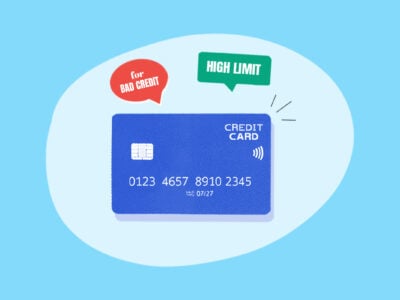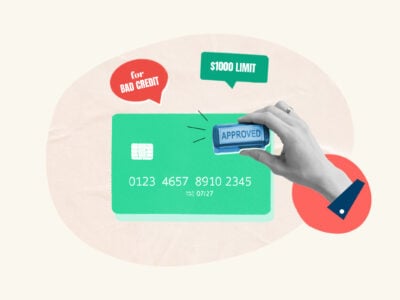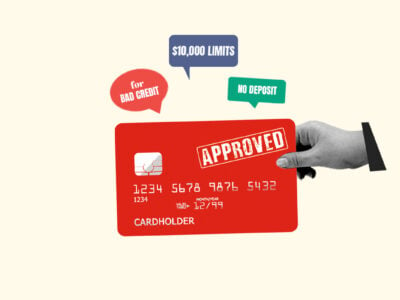Your credit limit is the maximum amount you can spend on your credit card at any one time. You’re not supposed to spend over this limit, but sometimes it can happen—whether by accident or because you’re in a financial bind and it’s the only way to pay your bills.
Read on to learn what the consequences for spending over your limit are and how to avoid doing it in the first place.
Table of Contents
Can you spend over your credit limit on a credit card?
Yes, it’s sometimes possible to spend over your limit on a credit card. It depends on whether your card offers a service called over-limit protection (and on whether or not you enabled it, since it’s always disabled by default).
This service, which is also known as over-limit coverage, is exactly what it sounds like: a feature that will let you rack up a balance that’s bigger than your credit limit. Without over-limit protection, if you try to perform a transaction that will exceed your limit, your card will simply be declined.
Over-limit protection can be dangerous
Over-limit protection sounds like a good thing, but the name is a bit misleading.
It’s true that it “protects” you from being unable to complete a transaction. This can be awkward, especially if you have no other way to pay for something you just bought.
However, over-limit protection can actually create risk instead of protecting you from it. If it’s enabled, your credit card issuer is allowed to hit you with serious penalties when you spend over your limit, which we’ll describe below.
In contrast, without over-limit protection, your transaction just won’t go through. This can leave you in a sticky situation, but once you sort it out (by finding an alternative way to pay), you won’t face any further consequences.
Consequences of spending over your credit limit
When you have over-limit protection and spend past your credit limit, you can face the following consequences:
Penalty fees
Your credit card issuer can hit you with additional fees for exceeding your credit limit. These are appropriately known as over-limit fees.
Per the Credit CARD Act of 2009, your credit card company is allowed to charge you up to $25 for your first over-limit transaction, and $35 if you exceed your limit again within a 6-month span. They can only impose one fee per billing cycle.
If your finances are tight, a fee like this can be a big deal. Even if your budget can easily absorb a $25–$35 fee, it’s still wasted money.
Worse credit card terms
Your credit card issuer may treat exceeding your credit limit as a violation of your credit card agreement, similar to going into default on your debt (failing to pay it). Consequently, they may adjust your borrowing terms in any of these ways:
- Hiking your APR: Your issuer could raise the APR (interest rate) on your card by imposing something called a penalty APR. This means you’ll have to pay more interest on your future purchases.
- Lowering your credit limit: Spending over your limit might make your issuer worry that they can’t trust you to responsibly manage large debts. They may choose to lower your limit (which ironically will make it even easier to exceed it in the future).
- Increasing your minimum payment: All credit cards come with a minimum monthly payment, which is the amount you’re required to pay even if you choose not to clear your full balance. Your credit card company might raise your minimum payment to compensate for the risk they think they’re taking on by lending to you.
Account closure
In extreme cases, your credit card issuer might close your credit card outright. They’re more likely to do this if you’ve had trouble managing your account responsibly in the past (if, for instance, you habitually miss payments or this isn’t the first time you’ve gone over your limit).
Damage to your credit score
Going over your credit limit won’t be recorded on your credit report, so it won’t damage your credit score as directly as a derogatory mark, such as a late payment. However, it can still hurt your score—just in slightly more complex ways.
Every major credit scoring model considers your credit utilization rate, which is the amount of credit that you’re using as compared with your limit. Credit experts generally advise keeping the utilization rate on each of your cards under 30%, and under 10% if at all possible.
When you spend over your credit limit, your utilization won’t just crack 30%—it will reach (and exceed) 100%. Needless to say, this can be deadly to your credit score.
Your score might take even more of a hit if your issuer closes your account. Closing a credit card can hurt your credit, especially if it’s done forcibly instead of voluntarily.
How to avoid going over your credit limit
As you’ve probably gathered, you don’t want to spend over your credit limit. Fortunately, it’s relatively easy to avoid.
Consider taking one (or more) of these steps:
Don’t opt in for over-limit protection
Again, without over-limit protection, transactions that would exceed your credit limit will be declined. This can be embarrassing, but it protects you from the consequences listed above.
If you choose not to enable over-limit protection, carry an alternative form of payment with you, such as cash, a debit card, or another credit card. That way, you’ll never be stuck somewhere (such as a restaurant) without the ability to pay for something you just bought.
Use more than one credit card
If you have a favorite credit card that you always use, consider spreading your debts around. Not only will this protect you from spending over your limit on any one card, it will also keep your credit utilization rate on each card low, which will benefit your credit score.
Ask for a credit limit increase
If you find you’re regularly in danger of maxing out your credit card, try to increase your credit limit to give yourself more of a cushion.
If you’ve previously missed payments or overspent on the card, your issuer probably won’t be willing to do this. However, if you have a good credit score and you’ve used your card responsibly, there’s a decent chance they’ll agree to your request.
On some cards, your credit limit may even be upgraded automatically after you’ve had the account open for a certain length of time (such as 6 months or 1 year).
Monitor your balance and pay your bills frequently
This solution might seem too obvious to mention—but it’s also 100% effective. The simplest way to avoid going over your credit limit is just to keep an eye on your balance and pay it off frequently so that it never creeps toward your credit limit.
How often should you pay off your credit card?
Ideally, you should pay off your credit card in full every month. In addition to protecting you from over-limit penalties, paying off your card in full will improve your credit score and prevent interest from accumulating on your debt.
Some people suggest paying even more frequently. Some experts advocate for a method called the 15/3 hack, which means making payments twice per month: 15 and 3 days before your statement closing date.
There’s nothing magical about those dates, but the principle behind the “hack” is sound. The more often you pay off your credit card debt, the better protected you’ll be against accidentally going over your credit limit.






